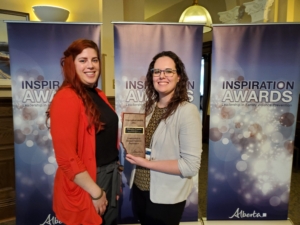Now Hiring Educator
CASASC is seeking to fill the position of Educator
The job details are as below:
Position: Educator
Reports to: Manager, Education Program and Community Relations
Number of positions: 1
Job Type: Permanent – Full Time
Hours per week: 37.5
Hourly rate: Determined based on education and experience
Anticipated Start Date: CLOSED – POSITION FILLED
Location: Red Deer, AB & frequent daily travel to communities within Central Alberta
About Us:
The Central Alberta Sexual Assault Support Centre (CASASC) is a voluntary, non-profit organization serving the Central Alberta region under the direction of a community-based Board of Directors.
We specialize in healing sexual trauma so you can talk freely about the hard stuff with no judgement. We provide a range of support services for individuals who are affected by sexual violence including counselling, play therapy, police and court support, crisis support and education.
JOB SUMMARY
As a part of CASASC’s Education team, the Educator supports our goal to increase the personal safety of individuals through awareness, education and empowerment, which will help to prevent sexual violence.
The Educator is a liaison between CASASC, community, schools and organizations, focusing on prevention and awareness education for children, youth, and adults. Our community and school-based programs are delivered to a range of individuals mainly from Kindergarten to Grade 12, but also to parents, adults and professionals.
This position provides in-person and virtual education sessions on a variety of content and topics focusing on violence prevention and sexual violence awareness, sessions are adaptable to meet the needs of community and school.
This position is part of the Education & Community Relations team. Educators may be expected to fulfill duties related to community relationship building, including attending meetings and events, staffing booths and conducting community visits. Educators are responsible for preparation, delivery, and follow-up of all applicable education programs as determined by CASASC and the Manager, Education & Community Relations.
The Educator is expected to have full knowledge of, and to follow the Philosophy, the Guidelines for Personnel Policies & Practices, and the Policies & Procedures of the CASASC while upholding our mission, vision, and values.
QUALIFICATIONS & SKILLS
- Bachelor’s degree in education or other relevant degree and/or 2+ years of related teaching experience.
- Exceptional presentation & public speaking skills.
- Experience working in, facilitating, or teaching in classroom and group settings.
- Ability to build rapport with children and youth from Kindergarten to Grade 12.
- Ability to relate to adults and professionals for the successful delivery of education and awareness information.
- Excellent verbal and written communication skills in English is essential.
- Able to work collaboratively in a team environment and/or independently.
- Superior time management skills, and the ability to prioritize tasks with minimal supervision.
- Proficient using computers and presentation equipment (incl. basic troubleshooting) of virtual and presentation platforms (zoom, google meet, projector, and sound setup).
- Proficient in Windows, Word, Internet, Email & Social Media is essential.
- Availability to work occasional evenings/weekends for special events and be able to travel within Central Alberta to fulfil job responsibilities.
- Professional, responsive, and positive work attitude.
- Must be able to submit a clear Criminal Record Check with Vulnerable Sector Screening.
- A valid Driver’s License with a satisfactory Driver’s abstract is essential, access to a reliable vehicle with full cover insurance.
- Should be able to fulfil the physical demands of the job such as the ability to lift at least 20lbs, climbing the stairs while carrying supplies, above-shoulder lifting, overhead reaching, frequent use of office equipment, sitting or standing for longer periods and other relevant physical tasks.
RESPONSIBILITIES
- Plan, prepare and deliver all CASASC education programs by providing interactive and dynamic presentations, and education material by using age-appropriate methods and activities, either in-person or virtual; in schools and communities throughout the CASASC service region.
- Design and deliver tailored education programs as/if requested by the schools, community and/or other agencies within CASASC’s service region.
- Participate in community public education forums and/or events to promote the awareness of sexual violence issues & CASASC services. (Attending interagency meeting, staffing booths and events, conducting community visits)
- Update education programs statistics in the tracking program and submit monthly/quarterly/annual reports to facilitate grants and internal requirements.
- Conduct regular research and keep education programs’ content up-to-date related to CASASC’s prevention education such as (but not limited to) sexual violence, teen dating, consent, healthy relationships, and any other program that supports CASASC’s mission and vision.
- Keep the schools and community contact list up-to-date. Stay in regular contact with the schools and community through different mediums to ensure the regular delivery of education programs to the target audience.
- Perform other duties or tasks that may be assigned on an as-needed basis by the Manager or Executive Director.
TEAM RESPONSIBILITIES/STAFF DEVELOPMENT
- Adheres to the values and guiding principles, policies, and procedures of CASASC and supports the strategic direction of the organization.
- Participates in staff meetings and offered trainings.
- Acts as a responsible team member by demonstrating initiative, completing work duties, and by maintaining clear, direct, and respectful communication with everyone in the work environment.
- Proactively stays current with best and emerging practices in the field. Participates regularly in the staff development activities according to a learning and development plan identified through supervision and the on-going performance review process.
- Provides back-up coverage to CASASC as required in response to the needs and priorities of the organization which includes other duties as and when assigned.
ORGANIZATIONAL RESPONSIBILITIES
- Maintains agency confidence and protects operations by keeping information confidential.
- Represents CASASC in a professional manner.
- Maintains on-going positive public relations with external agencies, groups, and individuals (if required).
- Uses appropriate mechanisms for resolving internal agency problems.
- Maintain professional relationship with internal and external stakeholders.
HOW TO APPLY
CASASC is an equal opportunity employer, and we value the importance of diversity, dignity, and worth of every individual in the workplace.
Please send your resume and cover letter with salary range expectations to casasc@casasc.ca. Mention your name and the position in the subject line, attachments must be in either PDF or Word (doc/.docx) format.
Application deadline: open until position is filled
We thank all applicants for their interest, however, only short-listed candidates will be contacted for interview.


